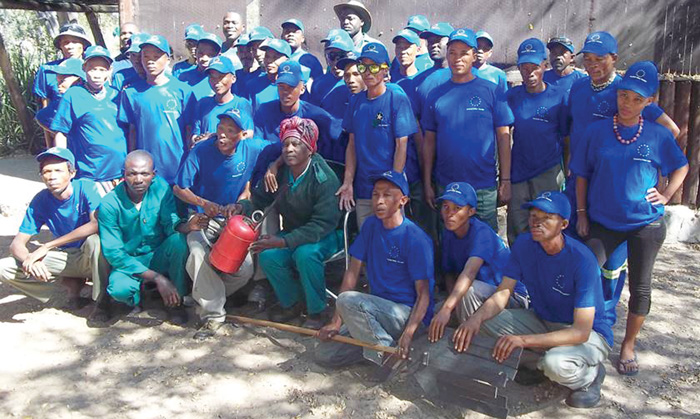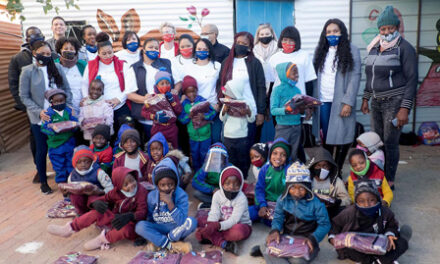
Kahunikwa learners receive four classrooms under the MTC Rural School Project

Learners of Kahunikwa Primary School in the Zambezi Region said goodbye to learning in mud-built structures as 4 classrooms and one storeroom constructed by the MTC and MVA Fund valued at N$1.2 million were handed over last week.
The completion of the classrooms blocks and handover took place after the telco this year in February set aside N$3.2 million to construct classrooms at Kahunikwa Primary School, Onduludiya Combined School, and Groendraai Primary School through its maiden CSI initiative – the MTC Rural School Project.
Launched in 2019, MTC CSI aims to assist the government in improving educational infrastructures such as dilapidated schools that lack decent structures or have none, by renovating and in most cases erecting new classroom blocks mainly for schools in rural Namibia.
Since its launch, the project has thus far built classrooms in Otjozondjupa, Kavango West,!Karas, Oshana, Kunene Region, Hardap, and Zambezi are the latest region to benefit from the Kahunikwa Primary School.
In August, MTC will hand over classrooms at schools in Ohangwena (Ondulundiya Combined School) bringing the tally to 41 classrooms constructed through the project thus far.
The collaboration between MTC and MVA Fund on the construction of classrooms at Kahunikwa Primary School is an industry clarion call to industry answered to bolster efforts to assuring the education journey for the Namibian child is carried out with dignity.
Kahunikwa Primary School was built in 2015 and has since been operating in mud structures that are unsafe for learning, let alone risky for learners. According to school Principal Rosenah Masene, four tents were used as classrooms. Parents at some point came together to build temporary structures which were blown away by stormy rains.
“In the mud structures, it is very cold during winter and hot during spring. We cannot thank MTC and MVA Fund, looking at where we come from. This is not only for the learners but the entire community,” said Masene.
Masene’s sentiments were echoed by school learner Maria Shindondola. “This classroom makes teaching and learning easier. This will uplift our future. With this building, it will make us better future leaders,” said the learner.
MTC Manager for Corporate Affairs, Sponsorship, and Promotion John Ekongo stressed the corporates’ stance on value addition reference to corporate social responsibility, saying it is important for corporates to invest in the same communities they reap their success.
“We [MTC] cannot just be an entity that declares millions in dividends but does not share that profit with the same people who make the company profitable. It is for this reason that MTC is listed so that ordinary Namibians can share in its success. We believe in creating a legacy when we invest in communities, hence the deliberate approach to change the lives of not only these learners but the community at large,” said Ekongo.
Philip Nghifitikeko, MVA Fund Chief Operation Officer who emphasized that the Fund has long enjoyed partnerships with MTC in the reduction of accidents, said it was befitting to join MTC on the construction of classrooms in rural schools.
This stance, he said, “allows the Fund to foster strategic partnerships and projects that have a lasting and sustainable impact in the lives of Namibians. A strong education system attracts professionals, businesses, and investment, and contributes to the community’s economic development,” said Nghifitikeko.
Read on her behalf by Zambezi Governor Lawrence Sampofu, Minister of Education, Arts, and Culture Anna Nghipondoka highlighted that it was no secret that the Ministry is hugely challenged with a backlog of many classrooms. This she said, had been brought about by the fact that the annual learner population growth over the years has not been commensurate to budgetary allocations.
“Education is a shared responsibility, and the Ministry needs more ‘Friends of Education’ such as MTC, MVA Fund, and many others, to come on board and join us on this seemingly difficult but exciting journey of knowledge and skills development of our learners, who are the architects of our country’s economic emancipation,” said the minister.
She added that the Ministry is currently busy constructing 510 classrooms and 70 ablution blocks across the country.
Since the inception of this project, the Minister of Education, Arts and Culture is on record highlighting that the Ministry needs a cumulative N$1,8 billion to clear the backlog in classes. This translates to a Herculean task of constructing 5 169 classrooms across the country to accommodate both primary and secondary pupils, in remote areas.












































